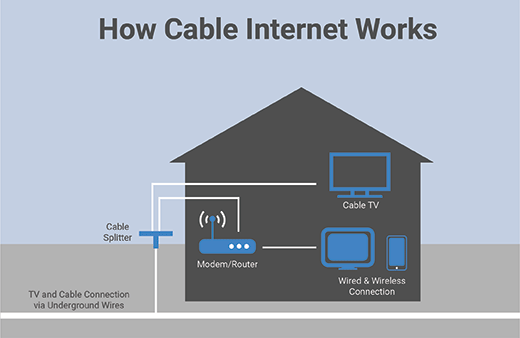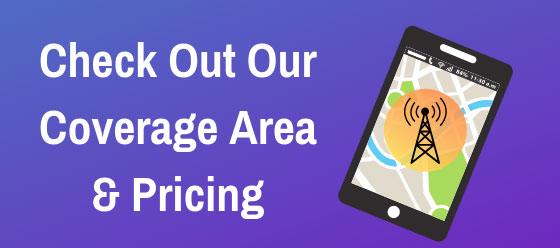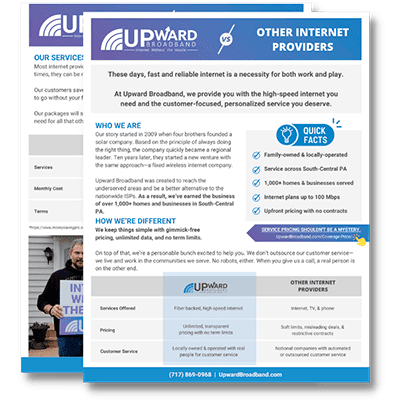Whether you’re signing up for internet for the first time in your new home or business or looking to make a switch, it’s important that you’re familiar with all the options out there. Knowing the pros and cons of each will help you stay connected in the way that works best for you.
Depending on where you live, cable internet has been a very popular option for years. However, in the ever-changing world of technology, another option is arising: fixed wireless internet.
In this blog, we’ll take a deep dive into each, so you’ll learn things like how they work, what kind of service you’ll get, and how much you’ll pay for that service.
- How Does Cable Internet Work?
- How Does Fixed Wireless Internet Work?
- What’s Faster: Fixed Wireless or Cable?
- Is Fixed Wireless Internet As Reliable As Cable?
- Accessibility of Fixed Wireless vs. Cable Internet
- What’s More Expensive: Fixed Wireless or Cable Internet?
- Do Fixed Wireless Companies Offer Better Service than Cable Internet Providers?
- Is Fixed Wireless Better Than Cable?
How Does Cable Internet Work?
Cable internet service providers connect their customers to the web through cable wires. These coaxial cables bridge the gap between your modem and the internet service provider’s facility.
For many years, cable has been one of the most popular methods of broadband internet, thanks to its reliability and quick upload and download speeds. However, in order to have access to cable internet, cables need to be laid to your business or home.
Laying cables for the necessary two-way connection is a fairly resource-intensive process, meaning there aren’t cable lines everywhere – especially not in rural areas. Cable companies have not invested as heavily in areas with low population densities as they have the cities and suburbs. This is because the more densely populated an area is, the more customers they can serve, and the more justified the infrastructure investment is.

How Does Fixed Wireless Internet Work?
Fixed wireless internet, on the other hand, transmits a fiber-optics-backed internet connection to its customers via radio waves. These internet signals are disseminated from the main access point or a transmitter affixed to a local tower.
An antenna-like device that’s fixed on your business or home receives that signal and connects your devices via a modem.
Unlike cable, the infrastructure is much less complex and requires fewer resources to set up. This makes it a popular option in areas where cable companies have not invested in heavily – those low-population-density areas that previously had few or no broadband internet options.
What’s Faster: Fixed Wireless or Cable?
Whether you’re streaming, surfing, or gaming, internet speed is an important part of picking a provider or service that’s right for you. When it comes to the difference in speed offered by cable and fixed wireless internet, it isn’t very big.
Both fixed wireless and cable offer broadband speeds, which, according to the FCC, are speeds of 25 megabits per second (Mbps) for downloading and 3 Mbps upload speeds. These speeds are typically not offered by DSL internet providers, who connect your home or business via phone lines.
Depending on your cable or fixed wireless provider, many offer speeds ranging from a low of 10 Mbps download speeds to 100 Mbps or even 1 Gbps.
Is Fixed Wireless Internet As Reliable As Cable?
The short answer is, for the most part, yes. Fixed wireless internet offers a stable and reliable internet connection.
Cable has been an extremely reliable source of internet for years, and that continues to be the case. By transmitting connection through cables, there’s very little potential for interference, unless the actual cable is cut for some reason.
But fixed wireless internet also offers a stable, reliable internet connection, even in poor weather conditions. Unlike satellite internet, the connection to fixed wireless internet is local, meaning it is not subject to the whims of the weather. While a satellite connection may have issues in storms – even if these storms aren’t close to you, fixed wireless internet will be okay.
Affixed to towers often the same height as cell phone towers, they’re below the clouds and rarely get blocked. In the event of rain, high humidity, or heavy fog, you should not have problems with a fixed wireless connection either.
You may hear that fixed wireless signals can be affected by something called rain fade. However, rain fade affects higher frequencies, while most frequencies that fixed wireless use are lower frequencies, meaning your internet should work perfectly well when it rains.
Accessibility of Fixed Wireless vs Cable Internet
Cable internet connects your home or business to the world wide web through, of course, cables. In order to have access to this cable connection, the cables have to be run to your home or business.
For many people living in rural or secluded areas, they do not have access to cable. Because expanding cable’s infrastructure is time-consuming and expensive, many cable companies focus their resources on areas with high population densities. While this makes sense in a business perspective, it leaves rural homes and businesses with limited options for internet. DSL and satellite can often serve these areas, but the connection is often slower than what the FCC considers to be broadband internet.
That’s where fixed wireless comes in. Fixed wireless has a much less resource-intensive installation, meaning it can expand into rural and less-populated regions, giving people an option for reliable, broadband internet access.
However, the connection is much more localized. Fixed wireless customers are typically within 10 miles of the main access point, and a direct line of sight between the tower and the home or business’s antenna must be maintained at all times.
So while fixed wireless internet is a great solution for those living in areas underserved by cable companies, it won’t be a solution for every single rural home or business – at least not yet.
What’s More Expensive: Fixed Wireless or Cable Internet?
In the long run, there is little difference between the rates of fixed wireless internet and cable internet. While cable may offer lower introductory rates in the beginning, these rates increase significantly six months or a year into your contract. With fixed wireless, you’ll pay a little more in the beginning each month, but that’s the rate you’re going to keep paying. With Upward Broadband, you’ll get 100% transparent pricing, and internet without the hassle.
Another benefit of fixed wireless internet is that you’ll have more control over what you pay for, instead of being forced into the crazy bundles or gimmicky pricing that can be common for cable internet packages. With some cable internet providers, a package with cable TV and a landline telephone may end up costing just about the same as just internet service. If you rarely or never watch cable TV or use a landline phone, this is frustrating.
Additionally, it’s not uncommon for cable internet providers to impose data caps on their customers. However, many fixed wireless providers offer plans with no data caps. Fixed wireless providers are also more likely to be smaller, local companies that are eager to earn and keep your business. They do this through excellent customer service – something that many of the big cable providers notoriously lack.
Do Fixed Wireless Companies Offer Better Service than Cable Internet Providers?
When it comes to your internet service provider, things can happen. Outages, slower speeds, billing errors. It’s how the internet provider handles these mistakes that make the difference.
Cable companies are notorious for poor service and support. Many of these companies have customers across the country. Getting issues addressed can seem bureaucratic, and getting regional support can take time and patience.
With most fixed wireless providers, however, you’ll be dealing with a much smaller, and more local team. They’ll get to know you, and you’ll get to know them. Because they’re serving a smaller set of customers in a smaller geographic area, they’ll be more responsive and attentive to any issues that may come up.
Is Fixed Wireless Better than Cable?
When it comes down to it, both cable and fixed wireless internet offer fast, reliable internet connections. While cable is available to many people in cities and suburbs, it’s a less common option in areas with fewer homes and businesses. That’s where fixed wireless comes in.
Fixed wireless providers offer a broadband internet connection to many places where there wasn’t one previously. They also tend to have more straightforward pricing and are locally based, making it an attractive alternative even in areas where cable internet is available.
| Fixed Wireless Internet | Cable Internet | |
| Speed | 10 Mbps or Less up to 1 Gbps | 10 Mbps or Less up to 1 Gbps |
| Reliability | Very Reliable | Very Reliable |
| Accessibility | Availability Varies but Includes Rural Areas | Available Mainly in Urban and Suburban Areas |
| Price | May Be More Expensive Than Cable Initially, but Not Necessarily After Cable’s Low Introductory Offers. Also Offers Straightforward Pricing and Unbundled Service | May Be Less Expensive Than Fixed Wireless in the First Few Months, but Not in the Long Run. Often Includes Data Caps and Bundling/Packages |
| Service | Smaller, Local Companies Focused on Customer Service | Larger Companies with Poor Reputations for Customer Satisfaction |






[…] internet are available in most places, they do not offer the same high-speed connection as cable and fiber. Fixed wireless brings a high-speed internet option to many areas where cable and fiber […]